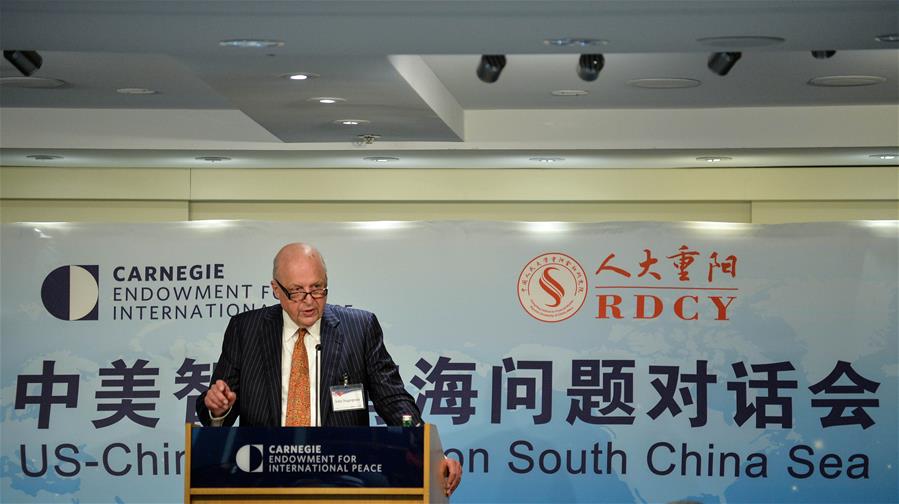
Former U.S. Deputy Secretary of State John Negroponte speaks during a dialogue on South China Sea issue in Washington D.C., the United States, July 5, 2016. One week ahead of the July 12 ruling over the South China Sea case initialed by the Philippines, a group of former Chinese and American officials and experts on international law and foreign relations held a dialogue in Washington to discuss the ruling's legality, possible reactions and its implications on the China-U.S. relations. (Xinhua/Bao Dandan)
MOSCOW, July 8 (Xinhua) -- The United States' activities in the South China Sea are raising tension unacceptable for the countries in the region and may force China to abandon the 1982 United Nations Convention on the Law of the Sea (UNCLOS), Russian experts said.
"The U.S. has always advanced the freedom of navigation issue in the South China Sea pointing to its special role in world trade, but such an approach is misleading," said Vasily Kashin, a senior research fellow at the Center for Comprehensive European and International Studies of the Moscow-based Higher School of Economics (HSE).
In a recent interview with Xinhua, Kashin said that there was a big difference between the freedom of merchant shipping and of military navigation.
Kashin pointed out that Beijing had never raised the question of the freedom of merchant ships' movement through its exclusive economic zone and in the South China Sea.
China, like several other countries, holds a special interpretation of the UNCLOS, considering that military activities in the exclusive economic zone may be carried out only with the consent of its owner state, Kashin said.
The U.S. Navy staged this year a series of so-called "freedom of navigation operations" close to Chinese waters, ahead of a July 12 ruling by the Permanent Court of Arbitration (PCA) in The Hague over a dispute between China and the Philippines in the South China Sea.
Chinese Foreign Minister Wang Yi warned U.S. Secretary of State John Kerry on June 6 that Beijing would not recognize any ruling of the arbitration and will firmly safeguard its own territorial sovereignty and legitimate maritime rights, as well as peace and stability in the region.
"It is obvious that the propaganda campaign surrounding the upcoming ruling is used to contain China. And it is accompanied by a hard power, when American planes and ships enter the area adjacent to the islands of the South China Sea," said Yuri Tavrovsky, professor at the People's Friendship University of Russia.
"I believe that China is responding correctly to actions of the Philippines and those countries that support Manila in playing the South China Sea card and that are attempting to blackmail China," said Sergey Sanakoev, president of the Russian-Chinese Analytical Center.
According to Sanakoev, if legal acts like the UNCLOS did not work, Beijing had the right to withdraw.
Tavrovsky echoed that "China has absolutely the right to act this way, as the whole international system is often used to the detriment of its national interests."
He lamented that current international bodies, the U.N. structure, as well as the international judicial system, were built on the basis of models created to a large extent by the United States and other Western powers in late 1940s.
"America has always been satisfied by playing according to these rules, provided it wins. But once it starts losing, it either starts a new game or overturns the playing table," Tavrovsky said.



